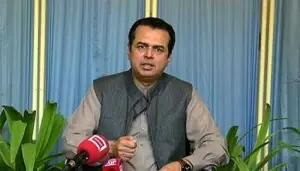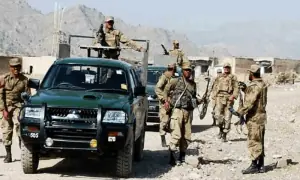SC bench to hear suo motu case on political crisis today
5 min readThe Supreme Court’s larger bench, which was formed by Chief Justice of Pakistan Umar Ata Bandial to hear the suo motu notice on the political crisis, will hear the case on Monday (today) at 1pm, Aaj News reported.
CJP Bandial took a suo motu notice on Sunday in view of the prevailing political crisis, which emerged after National Assembly Deputy Speaker Qasim Khan Suri prorogued the assembly proceedings after rejecting the united opposition’s no-confidence motion against Prime Minister Imran Khan and terming it against Article 5 of the Constitution.
In a written order, the chief justice, in tandem with his fellow judges, expressed concerns over the prevailing political crisis. The order was issued by the three-judge bench headed by CJP Bandial comprising Justice Ijazul Ahsan and Justice Muhammad Ali Mazhar.
The chief justice observed that public order must be maintained and no state functionary shall take any extra-constitutional step in the prevailing political situation.
The top court, after issuing notices to the Attorney General for Pakistan and others on the matter, had adjourned the hearing till Monday (today). The apex court also directed the AGP to determine the constitutionality of the National Assembly speaker’s ruling on the no-confidence motion against the prime minister.
During the hearings, the chief justice directed all the political parties in the country to act responsibly and said the law and order situation should not deteriorate.
“The public order should be maintained,” he added.
He said the court did not want to drag the hearing on account of Ramadan and that notices should be issued to all the political parties. The top judge also ordered the interior and defence secretaries to brief the court on the law and order situation in the country.
The chief justice accepted a request by Pakistan People’s Partys to review the ruling of NA Deputy Speaker National Assembly Qasim Suri.
The chief justice remarked that President Arif Alvi should be made a respondent in the case since it was an important matter, adding the Supreme Court Bar Association and all political parties should be made respondents in the suo motu notice.
The court issued notices to AGP Khalid Javed, the NA speaker, deputy speaker, defence and interior secretaries, all political parties to appear before the court today (Monday).
Political turmoil deepened on Sunday, when Prime Minister Imran Khan avoided an attempt to oust him and sought fresh elections after dissolving parliament, a move that the opposition termed treasonous and vowed to fight.
The deputy speaker of parliament, a member of PM Imran’s party, blocked an opposition no-confidence motion that Khan had widely been expected to lose, ruling it was part of a foreign conspiracy and unconstitutional.
That stymied the opposition’s attempt to come to power, and set up a potential legal showdown over the Constitution in the country of 220 million people.
Opposition leader Shehbaz Sharif called the blocking of the vote “nothing short of high treason” and said on Twitter there would be consequences for “blatant & brazen violation of the Constitution.” He added he hoped the Supreme Court would uphold the Constitution.
Bilawal Bhutto Zardari, head of the opposition Pakistan People’s Party, promised a sit-in at parliament and told reporters, “We are also moving to the Supreme Court today.”
The Supreme Court’s chief justice said on Sunday evening the court would hear the matter on Monday and that any directions given by the president and prime minister would be subject to the court’s orders.
The apex court then issued notices to Attorney General Khalid Khalid Jawed Khan, the speaker, deputy speaker, defence secretary, interior secretary, all political parties and adjourned the case's hearing till Monday.
The opposition blames Khan for failing to revive the economy and crack down on corruption. Khan has said, without showing evidence, that the move to oust him was orchestrated by the United States, a claim Washington denies.
Conspiracy
Khan said later on Sunday his evidence of the conspiracy was accepted by the National Security Committee.
“When the country’s highest national security body confirms this, then the proceedings were irrelevant, the numbers were irrelevant,” Khan said.
US officials on Sunday denied any involvement.
“There is no truth to these allegations,” a State Department spokesperson told Reuters on Sunday, adding “we respect and support Pakistan’s constitutional process and the rule of law.”
The opposition and analysts say Khan, an international cricket champion turned politician who rose to power in 2018 on the military’s support, had fallen out with it, a charge he and the military deny.
“Army has nothing to do with the political process,” Major General Babar Iftikhar, the head of the military’s public relations wing, said when asked about any involvement in Sunday’s events.
No prime minister has finished a full five-year term since Pakistan’s independence from Britain in 1947, and generals on several occasions have ruled the country, which is perennially at odds with fellow nuclear-armed neighbour India.
Imran stays
President Arif Alvi, also of Khan’s party, approved the prime minister’s request to dissolve parliament and cabinet. Khan will remain prime minister, said Fawad Chaudhry, the former minister of information and law.
Farrukh Habib, another former minister, said fresh elections would be held in 90 days, although that decision rests with the president and the election commission.
Deputy Attorney General Raja Khalid, a top prosecutor, resigned, calling the government’s dissolving of parliament unconstitutional. “What has happened can only be expected in the rule of a dictator,” he told local media.
The political fight comes as Pakistan faces high inflation, dwindling foreign reserves and widening deficits. The country is in a tough International Monetary Fund bailout programme.
Islamabad also faces international pressure to prod the Taliban in neighbouring Afghanistan to meet human rights commitments while trying to limit instability there.
PM Imran lost his majority in parliament after allies quit his coalition government and he suffered a spate of defections within his Pakistan Tehreek-e-Insaf party. A prominent newspaper had recently said Khan was “as good as gone“, but he had urged his supporters to take to the streets on Sunday ahead of the planned vote.
On the streets of the capital Islamabad, there was a heavy police and paramilitary presence, with shipping containers used to block off roads, according to a Reuters witness.
Police were seen detaining three supporters of Khan’s ruling Pakistan Tehreek-e-Insaf party outside parliament, but the streets were otherwise calm.
For the latest news, follow us on Twitter @Aaj_Urdu. We are also on Facebook, Instagram and YouTube.






















Comments are closed on this story.